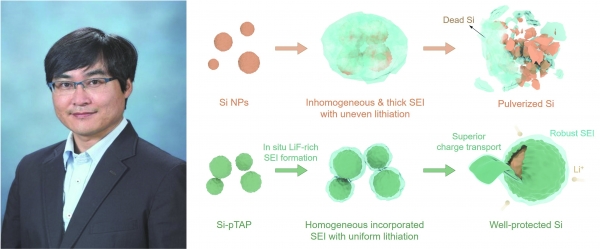
Long mileage ranges and fast charging speeds have become essential prerequisites in the electric vehicle (EV) market. While these two factors are closely related to battery capacity, research announcing a 400% increase in capacity is drawing attention.
The research team led by Professor Won Bae Kim (CE·GIFT), graduate student Jungsoo Park (GIFT), and Song Kyu Kang (CE) introduced novel conductive polymers in silicon anodes which enable battery to charge fast while maintaining outstanding capacity and stability. The study was published in the online edition of the Journal of Energy Chemistry.
Graphite is commonly used in the anode of EV batteries but has a limited energy capacity. Silicon could theoretically store 10 times more energy than graphite, so it is emerging as an alternative. However, the volume of the anode increases up to 300%, forming an unstable Solid Electrolyte Interphase (SEI) and breaking the silicon particles. As the battery is used, its stability decreases. Furthermore, the stability of SEI is issued when the volume of silicon anode material changes while charging and discharging are repeated.
To address this problem, the research team made an artificial SEI using polyaniline doped with p-toluenesulfonic acid and encapsulated the artificial SEI to the surface of the anode through strong hydrogen bonding. This polymer layer, with its lamellar structure, stored lithium ions between its layers and in situ formed a uniform SEI on the anode surface. As a result, the naturally generated SEI was induced to form uniformly on the film, resulting in the conductive polymer layer where the natural SEI and the artificial SEI made by the research team were integrated.
The integrated SEI developed by the research team effectively distributed the stress caused by the rapid volume change of the anode. Battery with the integrated SEI achieved a 570 mAh/g capacity at a current density of 10 A/g, indicating that the energy capacity remained stable under fast charging conditions. Notably, after approximately 250 cycles of fast charging, the battery maintained over 400% more energy capacity compared to existing batteries.
Prof. Kim commented, “This research offers a potential solution to overcome the existing limitations in the practical application of silicon anodes. We will continue exploring ways to improve the performance of EV batteries.”
This work was supported by the National Research Foundation of Korea grant funded by the Korean government, by the Human Resources Program in Energy Technology of the Korea Institute of Energy Technology Evaluation and Planning, granted financial resources from the Ministry of Trade, Industry & Energy, Republic of Korea, and by the Materials and Components Technology Development Program of the Ministry of Trade, Industry and Energy and Korea Electronics Technology Institute.


